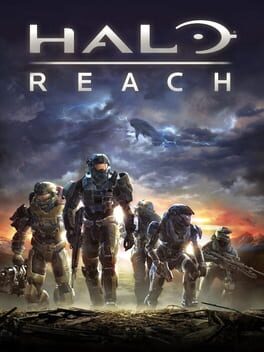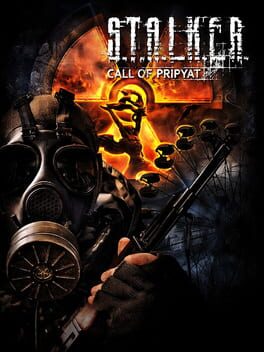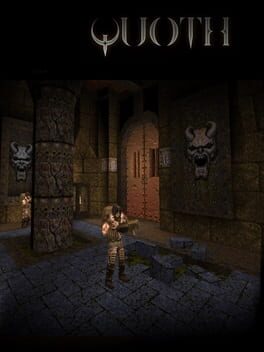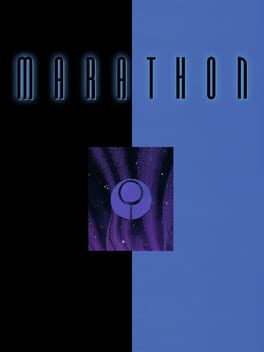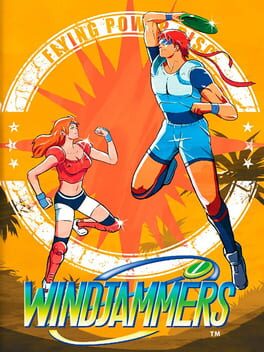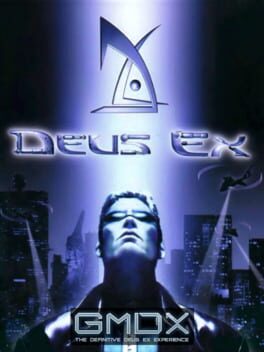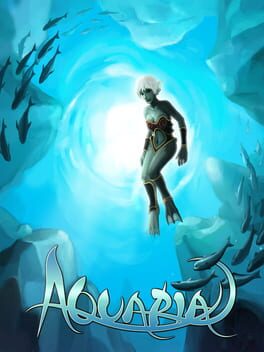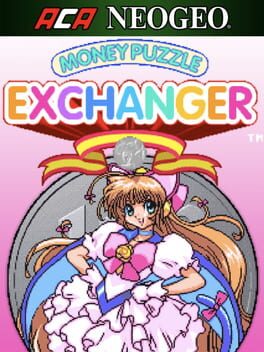2010
2014
An essential Quake mod. Before Arcane Dimensions came out it was pretty much the go-to mapper's mod for the game. Like AD, Quoth adds a lot of content for mappers to put in their levels. Unlike AD, the amount of new content is not astronomically large. While recent iterations of AD have an almost excessive amount of content, some of which was developed for basically one custom texture theme employed by one of the mod's huge centerpiece levels, Quoth's additions are specifically curated to be both internally coherent and consistent with vanilla Quake's aesthetic universe.
There are a lot of additions, from the aesthetic to the mechanical, but for most people the star of the mod is going to be the expanded bestiary. I can't say I'm in love with every addition, but overall it's one of the best out there. It works by filling in what were arguably gaps in the vanilla bestiary, like the extremely limited base roster and the "death guard" of knights which get new comrades.
Quoth's more otherworldly beasts include some of the strongest and weakest in the line-up. I'll just highlight a couple to show what I mean. On the weak end, you have the vorelings, which are kind of like fiends that have been neutered to the status of the headcrab, or the flying polyp with its ability to turn invisible. Both of these tend to be nuisances more than anything else, dealing damage which is both small and annoyingly difficult to avoid.
Then there's the gug. It's one of those monsters that can strike you as outright bullshit when you first encounter one, but once you learn its behavior it becomes a master class in downright evil (but fair!) enemy design. It has a devastating melee attack, so you can't get to close. You can't just flee into sniping range either, or it will launch an undodgeable, unblockable earthquake attack. The only way to deal with it without taking massive damage is to keep within range of its other attack, a nasty ball of green acid that splits apart in a V pattern in midair. The upshot is the same kind of delicate footwork that characterizes the shambler dance without being a mere reskin, more harrowing if anything, and the kind of design that only comes with a deep understanding of what makes Quake great in the first place.
Unlike most mods, Quoth doesn't come with a whole lot of actual levels out of the box, but it does include remakes of E1M1 and E1M2 that are well worth playing. Then there are unincluded semi-official levels by mod authors Kell and necros, including an E1M5 remake called Gloomier Keep that would fit nicely within a hypothetical Quothified Dimension of the Doomed. Beyond that, pretty much anything by than, mfx, or RickyT23 is worth checking out, along with Fort Ratsack, Metal Monstrosity, Shifting Planes, Func Map Jam 9... If you want a prime example of the social genius of Quake's modding scene, look to Quoth.
There are a lot of additions, from the aesthetic to the mechanical, but for most people the star of the mod is going to be the expanded bestiary. I can't say I'm in love with every addition, but overall it's one of the best out there. It works by filling in what were arguably gaps in the vanilla bestiary, like the extremely limited base roster and the "death guard" of knights which get new comrades.
Quoth's more otherworldly beasts include some of the strongest and weakest in the line-up. I'll just highlight a couple to show what I mean. On the weak end, you have the vorelings, which are kind of like fiends that have been neutered to the status of the headcrab, or the flying polyp with its ability to turn invisible. Both of these tend to be nuisances more than anything else, dealing damage which is both small and annoyingly difficult to avoid.
Then there's the gug. It's one of those monsters that can strike you as outright bullshit when you first encounter one, but once you learn its behavior it becomes a master class in downright evil (but fair!) enemy design. It has a devastating melee attack, so you can't get to close. You can't just flee into sniping range either, or it will launch an undodgeable, unblockable earthquake attack. The only way to deal with it without taking massive damage is to keep within range of its other attack, a nasty ball of green acid that splits apart in a V pattern in midair. The upshot is the same kind of delicate footwork that characterizes the shambler dance without being a mere reskin, more harrowing if anything, and the kind of design that only comes with a deep understanding of what makes Quake great in the first place.
Unlike most mods, Quoth doesn't come with a whole lot of actual levels out of the box, but it does include remakes of E1M1 and E1M2 that are well worth playing. Then there are unincluded semi-official levels by mod authors Kell and necros, including an E1M5 remake called Gloomier Keep that would fit nicely within a hypothetical Quothified Dimension of the Doomed. Beyond that, pretty much anything by than, mfx, or RickyT23 is worth checking out, along with Fort Ratsack, Metal Monstrosity, Shifting Planes, Func Map Jam 9... If you want a prime example of the social genius of Quake's modding scene, look to Quoth.
1994
The Marathon trilogy stands out from most FPS games of the time and even today for its extremely involved story, communicated to the player through diegetic computer terminals which I find aesthetically fascinating to this day. Despite having zero interactivity, limited graphics, and no voiceover, these terminals prove to be a surprisingly versatile expository tool, thanks to writing that is exceptional even by today's standards (at least in the video game realm).
The thing is, while I have a lot of nostalgia for the games, I find them rather tedious to play today. There are a few ideas that put me in mind of resource management-heavy games like System Shock, namely limited saving via "pattern buffers," diegetic healing terminals, and vacuum-based levels that drain your oxygen tank and restrict you to certain weapons. Unfortunately, inventory management is nonexistent, and the systems overall are hardly more complex than Doom's. Taken as action games, and despite a few impressive features like alternate fire modes and dual wielding, Marathon and its sequels play for the most part plays like Doom clones with shoddy AI and floaty physics. They could be excellent if they either had better/more nuanced action gameplay, or were expanded into more robust survival/resource management sims—the complicated story and cryptic level design have me leaning toward the latter—but as it stands I find the trilogy more of an interesting relic than anything else.
The thing is, while I have a lot of nostalgia for the games, I find them rather tedious to play today. There are a few ideas that put me in mind of resource management-heavy games like System Shock, namely limited saving via "pattern buffers," diegetic healing terminals, and vacuum-based levels that drain your oxygen tank and restrict you to certain weapons. Unfortunately, inventory management is nonexistent, and the systems overall are hardly more complex than Doom's. Taken as action games, and despite a few impressive features like alternate fire modes and dual wielding, Marathon and its sequels play for the most part plays like Doom clones with shoddy AI and floaty physics. They could be excellent if they either had better/more nuanced action gameplay, or were expanded into more robust survival/resource management sims—the complicated story and cryptic level design have me leaning toward the latter—but as it stands I find the trilogy more of an interesting relic than anything else.
1994
2013
I have to admit that compared to Deus Ex, I actually prefer the earlier Looking Glass games like Thief and the original System Shock. There are a few reasons for this, but only one of them is relevant to this review. Basically, while I do abstractly admire action RPGs that accommodate a variety of different builds and playstyles, in practice this often results in a compromise where the individual components are less robust than they could be if the development honed in on just one of them, or a few closely related ones. Balance issues are a side effect of this. Of course, the response is that I'm just nitpicker who misses the forest for the trees, and sure, I'm willing to concede that perspective to an extent. I suppose it's just a philosophical difference I have with hardcore fans of RPGs. (And don't get me wrong, Deus Ex is a really cool game, it's just not near the top of my favorites list.)
Then again there's GMDX, a mod that purports to fix a lot of Deus Ex's balance issues and generally add a layer of polish. Turns out this is the last thing the game needed to retain any kind of personality. I got to Paris by the time I gave up, but I realized the problem early on: if the sniper rifle isn't a better weapon at close range than an un-upgraded shotgun, what is even the point of Deus Ex?
Then again there's GMDX, a mod that purports to fix a lot of Deus Ex's balance issues and generally add a layer of polish. Turns out this is the last thing the game needed to retain any kind of personality. I got to Paris by the time I gave up, but I realized the problem early on: if the sniper rifle isn't a better weapon at close range than an un-upgraded shotgun, what is even the point of Deus Ex?
2007
This is definitely the worst game I'd consider a favorite, for reasons I'd fully cover in a review that would be too long to actually bother writing, but to summarize: Aquaria is a Zelda-like action-adventure game with metroidvania-style progression that takes place in an expansive aquatic world. The problem is the characters are boring, the story is boring, the voiceover is corny, the dungeons are mostly boring, the puzzles are trash, the bosses are trash, the Simon Says boss especially is trash, the late game areas are half-baked...
Here's the thing though: if you place emphasis on the "adventure" over the "action" aspect and pretend Aquaria is more of an exploration game (with occasional pressure from hostile wildlife) then it's actually pretty goddamn beautiful. First of all it's huge. Not Hollow Knight huge but it's way bigger than it initially seems. The camera dynamically zooms based on the size of the area you're in, which, especially near the beginning of the game when each new region you unlock is bigger than the last, goes a long way towards leaving an impression of sheer scale. The progression is pretty conventional metroidvania, but you're given a surprising amount of freedom to explore from a relatively early stage in the game. And Aquaria is a world that encourages that kind of engagement, rich as it is with so many unique locaitons and different forms of life. The beauty and variety of Aquaria is alone is enough to make me want to seek out its every nook and cranny and take immense pleasure in doing so. It's easily a 20+ hour playthrough if you find all the optional content (just don't actually complete it because again, the bosses etc. are trash), but I've done it twice—that's how fucking lush this world is to me. Sure, the game overall would be better if it had better gameplay, but there are any number of more polished and finely-tuned games, many of them featuring supposedly great characters and deep themes, with worlds that feel completely lifeless to me.
Aquaria's soundtrack is equally gorgeous, both in terms of its individual tracks in isolation, and the way motifs are reused across them, giving the game an almost symphonic quality.
Returning to Aquaria's gameplay, there is one aspect of it that I'll defend, namely that it can be controlled completely with the mouse. Technically this is the least efficient way of playing, since you can move and switch forms using the keyboard. Having to use the mouse to move, aim, AND switch forms with the color wheel would probably drive most players up a wall, but I personally find adapting to unusual control schemes to be an interesting challenge. It also makes the game a bit harder, which is probably a good thing since Aquaria is generally a pretty easy game.
Here's the thing though: if you place emphasis on the "adventure" over the "action" aspect and pretend Aquaria is more of an exploration game (with occasional pressure from hostile wildlife) then it's actually pretty goddamn beautiful. First of all it's huge. Not Hollow Knight huge but it's way bigger than it initially seems. The camera dynamically zooms based on the size of the area you're in, which, especially near the beginning of the game when each new region you unlock is bigger than the last, goes a long way towards leaving an impression of sheer scale. The progression is pretty conventional metroidvania, but you're given a surprising amount of freedom to explore from a relatively early stage in the game. And Aquaria is a world that encourages that kind of engagement, rich as it is with so many unique locaitons and different forms of life. The beauty and variety of Aquaria is alone is enough to make me want to seek out its every nook and cranny and take immense pleasure in doing so. It's easily a 20+ hour playthrough if you find all the optional content (just don't actually complete it because again, the bosses etc. are trash), but I've done it twice—that's how fucking lush this world is to me. Sure, the game overall would be better if it had better gameplay, but there are any number of more polished and finely-tuned games, many of them featuring supposedly great characters and deep themes, with worlds that feel completely lifeless to me.
Aquaria's soundtrack is equally gorgeous, both in terms of its individual tracks in isolation, and the way motifs are reused across them, giving the game an almost symphonic quality.
Returning to Aquaria's gameplay, there is one aspect of it that I'll defend, namely that it can be controlled completely with the mouse. Technically this is the least efficient way of playing, since you can move and switch forms using the keyboard. Having to use the mouse to move, aim, AND switch forms with the color wheel would probably drive most players up a wall, but I personally find adapting to unusual control schemes to be an interesting challenge. It also makes the game a bit harder, which is probably a good thing since Aquaria is generally a pretty easy game.
